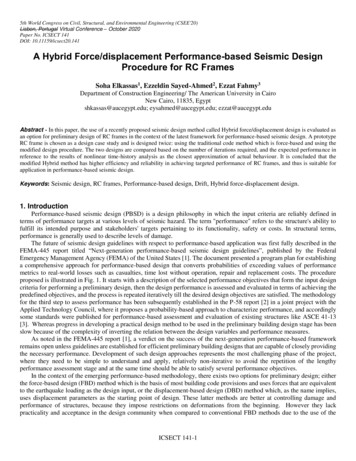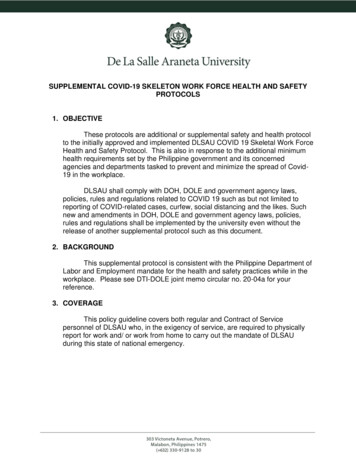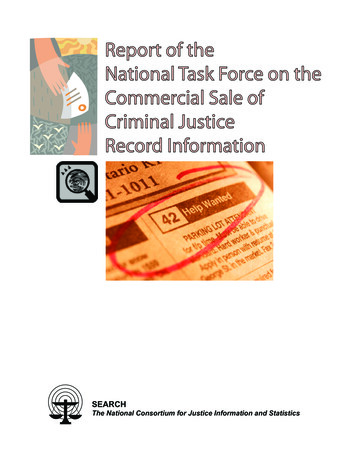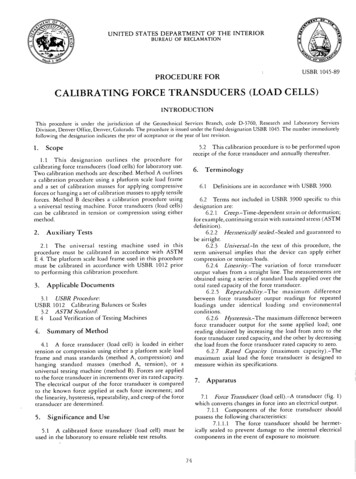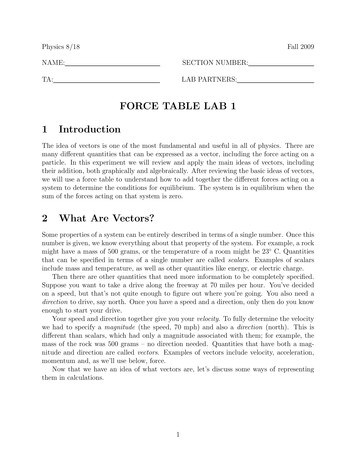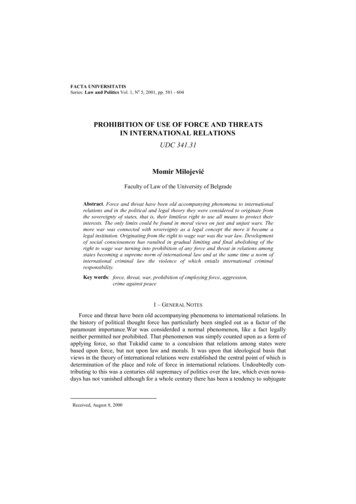
Transcription
FACTA UNIVERSITATISSeries: Law and Politics Vol. 1, No 5, 2001, pp. 581 - 604PROHIBITION OF USE OF FORCE AND THREATSIN INTERNATIONAL RELATIONSUDC 341.31Momir MilojevićFaculty of Law of the University of BelgradeAbstract. Force and threat have been old accompanying phenomena to internationalrelations and in the political and legal theory they were considered to originate fromthe sovereignty of states, that is, their limitless right to use all means to protect theirinterests. The only limits could be found in moral views on just and unjust wars. Themore war was connected with sovereignty as a legal concept the more it became alegal institution. Originating from the right to wage war was the war law. Developmentof social consciousness has rasulted in gradual limiting and final abolishing of theright to wage war turning into prohibition of any force and threat in relations amongstates becoming a supreme norm of international law and at the same time a norm ofinternational criminal law the violence of which entails international criminalresponsibility.Key words: force, threat, war, prohibition of employing force, aggression,crime against peaceI – GENERAL NOTESForce and threat have been old accompanying phenomena to international relations. Inthe history of political thought force has particularly been singled out as a factor of theparamount importance.War was considerded a normal phenomenon, like a fact legallyneither permitted nor prohibited. That phenomenon was simply counted upon as a form ofapplying force, so that Tukidid came to a conculsion that relations among states werebased upon force, but not upon law and morals. It was upon that ideological basis thatviews in the theory of international relations were established the central point of which isdetermination of the place and role of force in international relations. Undoubtedly contributing to this was a centuries old supremacy of politics over the law, which even nowadays has not vanished although for a whole century there has been a tendency to subjugateReceived, August 8, 2000
582M. MILOJEVIĆthe politics to the law at least to the extent necessary to preserve the highest values of themankind such as peace and security.Force in the international community, featured by high degree of decentralization, hasbeen used to different purposes both for previous actions or pressure (intervention) and expost facto for punishing because of nonperformance according to demand (sanctions).War as the hardest form was most frequently used for the purpose of grabbing parts of aterritory or total subjugation some state. While reprisals have always been considered asviolence of law, there was no a unique opinion on war. According to one view, war wasconsidered a permissible means of politics coming from the sovereignty, neither delict norsanction, says Kelsen.1 However, it would be wrong to believe that there was indifferencetowards war and misfortunes it brought about the best testimonies on which are efforts tojustify recourse to war from the ancient times to the present days. Even the peoples of ancient East knew about the division on defensive and offensive, that is, just and unjustwars. Greek writers and philosophers grudged against war while the statesmen searchedfor reasons to justify wars looking for responsibility to commence a war. Victoriuoscountries even put to trial leaders of belligerent countries guilty for war.2 Differentiationbetween just and unjust wars has further been developed in Rome, but the criterion waspurely formal because respect for strict procedure of commencing war was in question.Essentially, an unjust war could formally be permissible. Thus, differentiation betweenjust and unjust wars was turning or approaching to the differentiation between permissibleand prohibited wars.There appeared several views in the Middle Ages related to certain religions, buttighly connected for the existing social relations of the age. While exiled, christianity considered each use of force even war immoral and was against military service. When it became a state religion it changed its attitude towards war so that St. Augustin (354-430)formulated the theory on just war against the nonlaw. In Byzantium war was considered anormal and peace nonormal state. War against non-Christians was always rihteous. Islamic teaching considered that war is just against the heretics and infidels as well.3 Nevertheless, prevailing were the views that were developed within the Catholic Church, atthat time the only social power that linked all states and peoples of the Western Europeand imparted the spirit and essence to international law. Developed in the theory (T.Aquinas, Vittoria, Wolf) was a view on just and unjust wars. According to that view waris permissible as an answer to violations of rights as well as reprisals. Vittoria's opinionwas that soldiers had the right to refuse obedience to their leaders if they thought that warwas unjust. If not a sanction, war is delict.4 Some writers think that that view has laterbeen expressed in the regulations of the League of Nation Pact,5 Kellogg-Briand Pact and1For more details, see J. Даниловић, "Justum bellum"и репресалије у првим вековима римске историје,"Годишњк Правног факултета у Сарајеву", 1975, pp.39-64.2M. Сукијасовић, Појам агресије у међународном праву, Београд, 1967, pp. 15, 20.3Ibid, p. 17.4H. Kelsen, The Law of the United Nations, Second impression, London 1951, p. 707; - Théorie pure de droit,Paris 1962, pp. 422, 423.5Ђ. Поповић, Класиици међународно-правне доктрине, Београд 1933, p. 47; - M. Sibert, Traité de droitinternational public, Paris 1951, pp. 579-580.
Prohibition of Use of Force and Threats in International Relations583the Charter of the United Nations althoug in these cases permissible deffensive, that is,legal and illegal wars are in question.6II – WAR AS A LEGAL INSTITUTIONAccoring to Saint Thomas Aquinas' (1225-1274) theory of natural law, war was just ifit fulfilled three conditions: 1) to be waged by the authorities empowered to do that (auctoritas principis), 2) that the cause is just (justa causa) and 3) that the intention is correct(intentio recta). Although the second condition is essential, the first one gained in importance in the passage of time because war was always linked with the sovereign. Thus, theright to wage war became an integral part of sovereignty. Since sovereignty was "deemedmore or less unlimited thus neither the right to wage war could not come under any legallimitations".7 Having become a characteristic and expression of sovereignty8 as a legalconcept war became a legal institution producing legal consequences9 during many centuries. One of the first and probably the most important consequences in practice wasdisappearance of differences between offensive and defensive wars, on the one hand, andunjust and just wars, on the other hand. According to Rutgers, the concept of absolutesovereignty has killed the doctrine on just war10 and, in fact, that doctrine has been transformed into the doctrine on legal war which can be declared by the legal authorities.11Thus, both the unjust and offensive wars could be legal if the competent authorities, according to their understanding, thougt them justified. There resulted the same consequence as that in the Roman understanding of just war. Further consequence was that existence of war state and application of the war law rules then in the phase of creation depended on the formal moments (declaration of war and intention ). From the right to wagewar (jus ad bellum) there resulted war law (jus in bello) because war as a legal institutioncould be regulated by law and limited in a number of directions.Hugo Grotius (1583-1645) was the first to point to the difference between jus ad bellum and jus in bello redressing balance between them such as between war and peace12replacing and mutually excluding each other (inter bellum et pacem nihil est medium).Justifying, like all the contemporaries, use of force he endeavoured by his doctrine temperamenta belli to find balance between the military need and human considerations. Ifwar comes from discretional (sovereign) right of state to decide how to gain or protectsome of its right (self-help), then it can be used as the last resort (ultimum medium regnorum) if other resorts are insufficient. This opens the way to introducing peacefull settlement of disputes (at least optionally), while limiting the way of waging war (jus in bello)but not interfering with the very right to wage war (jus ad bellum). Moral causes are being6J.L. Kunz, Bellum justum and bellum legale, "American Journal of International Law", 1951, No. 3, p. 532.Ђ. Нинчић, Проблеми суверености у Повељи и пракси Уједињених нација, Београд 1967, p. 65.8М. Радојковић, Рат и међународно право, Београд 1947, p. 6.9Ђ. Нинчић, op.cit, p. 65.10V.H. Rutgers, La mise en harmonie du Pacte de la Société des Nations avec le Pacte de Paris, "Recueil descours de l'Académie de droit international de La Haye", 1931, t. 38, p. 19.11М. Сукијасoвић, Појам агресије, p. 22.12This is best shown by the title of his famous book De jure belli ac pacis (1625).7
584M. MILOJEVIĆcited for both (justa causa, "just war") by means of which resorting to power is justifiedwhile the same causes explain allevaition of war misfortunes as an excuse "to have hadto" resort to war. "Also, the writers admit, either directly or indirectly, the legitimacy ofwar as a means to conduct policy of states. If the old differentiation between just (bellumjustum) and unjust (bellum injustum) wars becomes apparent that differentiation is still ofenormous importance in moral sense although deprived of any value from the law point ofview."13 From the international law point of view, by the end of the 19th and beginning ofthe 20th centuries war was considered an exception state but legal one.14 La Pradelledeemed that regulation of war ment its legalization.15 Contrary to that, Ilić thought thatinternational law had legalized war recognizing it as an expression of sovereignty ofstates. "In other words, war was considered legal prior to and beyond any passing ofregulations on it."16 International law deems war a social phenomenon and tries to subjectits acts to certain regulations.17 "The right to war is nothing else but the right, possibilityto wage war."18Also, war was thought of as a sanction although it was, according to an author of ours,"monstruous reasoning" to think killing of those governed due to the acts of their rulers "akind of law category" because war can result for want of disadvantages in the organization of both states and the world community. That is why that advocate of Duguit's viewthinks that to pay due status of respect to sanction in international law – even collectivesanction – means to essentially contribute to its existence as a phenomenon." Accordingto him, such view is a sign of insufficient ideological level of the science of internationallaw. 19 Such average estimation of the level of the science of international law seems toostrict, because a cursory glance at the literature shows that many theoreticians have beenbeyond reality of their times, which was not at all easy because science must operate onthe basis of facts. Against any war were Wycliffe, Sir Thomas More, Erasmus and others.For example, Ilić was against war not only because war, as a form of violence, had neverbeen in line with law, but also because its aftermaths were not in harmony with law20although he had to admit that in the past war was "an instrument of civilization", whichshowed that that civilization was only "a little bit civilizing".21 Considerably prior to himsuch view was developed in Germany by Ludwig Quidde,22 the renowned pacifist (later aNobel peace prize winner), while anti-war activities in Europe are centuries old.2313М. Радојковић, Рат и међународно право, p. 6.Ibid. p. 5.15A. La Pradelle, La Conférence de la Paix, "Revue générale de droit international public", 1900, p. 13.16М. Илић, Општа разматрања о Друштву народа и његовом праву, Београд 1966, p.112.17Ibid., p. 107.18Ibid., p. 109.19Л. Серб: Неки основни проблеми међународног права, "Југословенска ревија за међународно право",1957, No.3, p. 345.20М. Илић, op. cit., p. 104.21Ibid, p. 103.22M. St. Marković has published an extensive note on a lecture of L. Quidde, Идеја о миру и новомеђународно право, "Архив за правне и друштвене науке", 1906, No. 1, pp. 71-74.23On that, see: J. Graven, Le difficile progrès du règne de la justice et de la paix internationales par le droit,"René Cassin amicorum discipulorumque liber II", Paris 1970.14
Prohibition of Use of Force and Threats in International Relations585III – LEGAL LIMITING OF WAR"Governing originally the whole world, in all human relations, power has seen howthe domain of its rule decreases in favour of law."24 The first tangible result in limitinguse of force was recorded in 1899 when, under the Convention on Peacefull Settlement ofDisputes, states comitted themselves to do their utmost, "if circumstances permit", to provide peaceful settlement of disputes for the purpose of "as much as possible to avoid resorting to force" in their mutual relations (Article 1-2). That process of limiting war wascontinued at the Second Hague Conference (1907). Under the Convention (III) on Commencing Hostilities the states bound themselves not to commence war "without previousunambiguous warning that will have either a form of a justifed declaration of war or aform of an ultimatum with a conditioned declaration of war" (Article 1).Much greater importance is that of the partial limiting of the right to wage war underthe Convention (II) on Limiting Use of Force for Collection of Contractual Claims. Stateshave comitted themselves not to resort to the armed force for the purpose of collectingcontractual claims of their citizens except in case when a state debtor refuses or does notanswer the arbitration offer or, in case of acceptance, makes compromise impossible ordoes not obey the verdict pronounced (Article 1).25The process of pushing out force by peaceful settlement of disputes has been continued on the American continent. Beginning from 1912, the United States have concludedagreements (Briand's agreements) with other states under which committees have beenestablished to consider disputes and submit reports to the parties in dispute within 12months. States did not have to resort to war until the committee submited a report. Thatwill be even more worked out in the League of Nations Pact where ideas from the Hagueand Briand Conventions are combined and built into the system of collective security.Thus, according to Brownlie, "an assumption of illegitimacy of war as a means of seflhelp" has been introduced. 26It is interesting that, after the World War I, the conquered states have accepted the responsibility for the war aftermaths, but not for its commencement,27 for violations of thewar law, not for the war itself. The Allies have refused that view and have taken a stancethat the obligation to pay war damages results from the responsibility for war. This is theway some authors interprete peace agreements28, although their regulations do not providequite safe ground for that. The Committee for Establishing Responsibilities for War hasconcluded that Germany, Austria, Turkey and Bulgaria are also guilty of war and violation of neutrality of Belgium and Luxembourg and the borders of Serbia and France, butnot for the criminal responsibility of individuals. The Peace Conference has taken a con24М. Илић, op. cit., p. 181.In our literature, M. Новаковић, О међународно-правној заштити поверилаца једне државе (поводомДрагове доктрине), "Архив за правне и друштвене науке", Book IV, 1907, No. 5, pp. 427-436; No. 6, pp.554-565; Book V, 1908, No. 1, pp.93-100; No. 2, pp. 166-172.26I. Brownlie, International Law and the Use of Force by States, Oxford 1963, p. 5727In a note to the Allies of 13 May, 1919, the German delegation underlined that agreement to pay reparationsdid not mean acceptance of the respondibility for the war because the obligation to pay reparations could not belinked with the question of guilt of war. This corresponds to the view on differentiations between the war lawand the right to war.28I. Brownlie, op. cit., pp. 135-140; -. М. Сукијасовић, Појам агресије, p. 29.25
IN INTERNATIONAL RELATIONS UDC 341.31 . According to Rutgers, the concept of absolute sovereignty has killed the doctrine on just war10 and, in fact, that doctrine has been trans-formed into the doctrine on le



